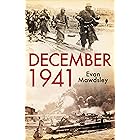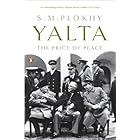| Digital List Price: | $17.99 |
| Kindle Price: | $2.99 Save $15.00 (83%) |
| Sold by: | Amazon.com Services LLC |
Your Memberships & Subscriptions

Download the free Kindle app and start reading Kindle books instantly on your smartphone, tablet, or computer - no Kindle device required.
Read instantly on your browser with Kindle for Web.
Using your mobile phone camera - scan the code below and download the Kindle app.

 Audible sample Sample
Audible sample Sample 


Eight Days at Yalta: How Churchill, Roosevelt, and Stalin Shaped the Post-war World Kindle Edition
Crimea, 1945. As the last battles of WWII were fought, US President Franklin Roosevelt, British Prime Minister Winston Churchill, and Soviet Premier Joseph Stalin—the so-called “Big Three” —met in the Crimean resort town of Yalta. Over eight days of bargaining, bombast, and intermittent bonhomie, they decided on the endgame of the war against Nazi Germany and how the defeated nation should be governed. They also worked out the constitution of the nascent United Nations; the price of Soviet entry into the war against Japan; the new borders of Poland; and spheres of influence across Eastern Europe, the Balkans, and Greece.
Drawing on the lively accounts of those who were there—from the leaders and advisors such as Averell Harriman, Anthony Eden, and Andrei Gromyko, to Churchill’s secretary Marian Holmes and FDR’s daughter Anna Boettiger—Diana Preston has crafted a masterful chronicle of the conference that created the post-war world.
Who “won” Yalta has been debated ever since. After Germany’s surrender, Churchill wrote to the new president, Harry Truman, of “an iron curtain” that was now “drawn upon [the Soviets’] front.” Knowing his troops controlled eastern Europe, Stalin’s judgment in April 1945 thus speaks volumes: “Whoever occupies a territory also imposes on it his own social system.”
- LanguageEnglish
- PublisherAtlantic Monthly Press
- Publication dateFebruary 4, 2020
- File size13399 KB
Customers who bought this item also bought
From the Publisher


|
|
|
|
|---|---|---|
|
|
|
|


Editorial Reviews
Review
“A colorful chronicle of high-stakes negotiations and a study in human frailties, missteps, and ideological blunders.”―Washington Post
“Ms. Preston’s conference narrative abjures authorial hindsight judgments, placing the spotlight instead on the characters’ natural blind spots and biases. She also devotes a full third of the book to the summit’s historical context and personalities, the latter of which are nicely developed.”―Wall Street Journal
“A highly readable, highly detailed account of the historic meetings and often difficult and contentious negotiations between Churchill, Roosevelt, Stalin, and their staffs, and a vivid description of the once ornate Tsarist palaces and their much deteriorated wartime condition that served as the setting for meetings, dinners, and private talks.”―New York Journal of Books
“Lively and nuanced . . . Shrewd on the main personalities . . . Preston goes beyond the horse-trading of three old men, with vivid scene-setting of the tsarist palaces where the conference took place.”―Times (UK)
“In this well-written and absorbing book, Diana Preston provides a chronological narrative of these crucial eight days.”―Airmail
“On the Yalta conference’s 75th anniversary, this insightful history recounts its enormous, if teeth-gnashing, accomplishments . . . Impressively researched . . . An expert account of an unedifying milestone at the dawn of the Cold War.”―Kirkus Reviews
“[A] spirited, behind-the-scenes account of the February 1945 Yalta Conference. Preston mixes foreign policy critique . . . with vibrant descriptions of backstage activities . . . Colorful personalities, piquant details, and a diverse array of perspectives make this a satisfying introduction to the subject.”―Publishers Weekly
Praise for Diana Preston:
“Preston deftly and graphically weaves the complex stories―hitherto kept distinct―of these land, sea, and air innovations into a connected narrative. For the first time, readers can grasp the mounting cognitive assault on civilians, soldiers, and politicians of the curious clustering of events that spring.”―New York Times Book Review, on A Higher Form of Killing
“A gripping and excellent book . . . [Preston’s] extensive archival research fills in the historical chronology with well-selected quotations from personal accounts of participants at every level of civilian and military life.”―Washington Post, on A Higher Form of Killing
“Unforgettable . . . The definitive account of the Lusitania.”―Philadelphia Inquirer, on Lusitania: An Epic Tragedy
“As majestic as its subject . . . Extraordinarily readable.”―Chicago Sun-Times, on Lusitania: An Epic Tragedy
“An engaging narrative . . . Rich in detail and texture.”―San Diego Union Tribune, on Before the Fallout: From Marie Curie to Hiroshima
“Ultimately this book is about survival, and the author engagingly recounts the nearly impossible task of trying to establish a penal colony with few supplies and poor agricultural conditions. Preston shines in her description of the true nature of Captain Bligh . . . A wonderful look into the beginnings of Australia and the remarkable strength of the survivors of these dangerous voyages.”―Kirkus Reviews, on Paradise in Chains
About the Author
Product details
- ASIN : B07YBKMPZ2
- Publisher : Atlantic Monthly Press; Illustrated edition (February 4, 2020)
- Publication date : February 4, 2020
- Language : English
- File size : 13399 KB
- Text-to-Speech : Enabled
- Screen Reader : Supported
- Enhanced typesetting : Enabled
- X-Ray : Enabled
- Word Wise : Enabled
- Sticky notes : On Kindle Scribe
- Print length : 846 pages
- Best Sellers Rank: #275,015 in Kindle Store (See Top 100 in Kindle Store)
- #152 in History of Russia eBooks
- #296 in 20th Century World History
- #837 in World War II History (Kindle Store)
- Customer Reviews:
Customer reviews
Customer Reviews, including Product Star Ratings help customers to learn more about the product and decide whether it is the right product for them.
To calculate the overall star rating and percentage breakdown by star, we don’t use a simple average. Instead, our system considers things like how recent a review is and if the reviewer bought the item on Amazon. It also analyzed reviews to verify trustworthiness.
Learn more how customers reviews work on Amazon-
Top reviews
Top reviews from the United States
There was a problem filtering reviews right now. Please try again later.
The book covers the lead up to the conference, the conference itself and the effects of the conference on subsequent world history. All parts are interesting but those who have read much of the history of the period leading to the start of the war will find nothing new here. What I found most interesting was the discussions between the principles - Churchill, Roosevelt and Stalin - and the author's comments on the shortcomings of the western leaders and their blindness to who they were really dealing with. The author, Diana Preston, pulls no punches while, at the same time, she is clear on exactly what limitations they were under, considering that the Red Army was already in possession of the lands under discussion.
This is a well researched book, full of footnotes, and so I found it surprising that there was a blatant mistake in it. Dr Preston states that General George Marshall was the first American to receive a 5th star, and that is not accurate. He was the first General to receive a 5th star but Admiral Leahy received his 5th star the day before George Marshall, and then both were followed, one day apart, by the remaining 5 star appointments - King, MacArthur, Nimitz, Eisenhower and Arnold, in that order. The appointments were made one day apart so that there would be no question as to the ranking of the officers involved.
This is a very interesting book and I recommend it for anyone interested in World War II.
Diana Preston, the author, has written several books of history, with subjects as diverse as ancient Rome and 19th century Afghanistan. Her style is clear and while she concentrates a bit too much on small details, these do help to create a well-rounded picture of the participants and places.
Preston does not impose her interpretation of events on the listener - she sets out facts and lets the reader draw her own conclusions, most of the time. But the facts she sets forth have their own slant. For example, she stresses how ill FDR was at the Yalta meeting in February, 1945, only two months before his death. This is a well known fact stressed mostly by those who believe that FDR was so ill that he 'gave away' eastern Europe to the Reds. Only in the last chapter does Preston correct this impression by pointing out that Churchill was not ill and that Harry Truman who succeeded FDR fared little better at Potsdam, even though by that time, he was aware of the successful testing of the atomic bomb.
Regarding the atomic bomb, Preston points out that neither FDR nor Truman used it very well. One of the major goals of both the US and UK was to get Russia into the Japanese War - Japan had carefully avoided attacking any Russian territory in Asia and the USSR was fully occupied by the Germans in the West. The fierce opposition of the Japanese as the US forces approached mainland Japan made getting the Russians into the war a necessity if the US was to keep casualties as low as possible. At Yalta and then at Potsdam, the USSR agreed to declare war on Japan no later than August 8, 1945. When the US dropped the atomic bomb on Hiroshima on August 6, and 3 days later the Russians attacked Japan, it looked as if the Russians were hastily joining the war to get in on the spoils. In fact, they were merely fulfilling their agreement to declare war by that date.
Preston points out that neither the US nor the UK were fully briefed on the progress of the Bomb to use it in negotiations. Why is a mystery - the US had spent incredible amounts of money to develop the Bomb and so, one would think, its leaders would be well-schooled in its progress. Preston offers no clues.
While Preston points out many times that both the leaders of the US and UK told their people that they got the very best deal they could under the circumstances, it is clear that she doesn't think so. She does say that it is only in hindsight that such a conclusion is possible. In fact, even with hindsight, it is not. Russia had lost many times more humans and material in the war than any of her allies. From 1941 until D-Day, she and she alone was bearing the brunt of the war in Europe. Her troops had fought back all the way from the gates of Moscow to the border with Germany and onto the gates of Berlin.
By war's end, Russia was in taters. Yes, she had a huge army, but Stalin himself often repeated that without Lend Lease and the equipment sent to her by the US, victory would have been impossible. If there was one thing Russia wanted it was - peace. She could never allow the countries on her long European border to be used by a revitalized Germany or by the new Super Power United States to act as a springboard into Russia. Those countries had to be pro-Russian. How could Russia make certain of that? Well, we know how - for 40 years those countries were controlled by Moscow.
Was there any way that the US and UK could have changed that outcome? I don't see how. Even though the US had the bomb, the actual number of warheads was exactly zero after two were dropped on Japan. Even if they could have been replenished quickly, would the American public have stood for dropping an atomic bomb on Russia and even if they would have, what good would the destruction of Moscow or Kiev have done? The Russians had proven that they were never going to surrender even when their cities had been destroyed by the Nazis.
Preston also fails to state the facts that are set forth in Drawing the Line: The American Decision to Divide Germany, 1944–1949 by Carolyn Woods Eisenberg. Professor Eisenberg proves with original documentary sources, that U.S. policy makers chose partition of Germany and then mobilized reluctant West Europeans behind that approach. The US used its nuclear bomb monopoly to force its agenda on the USSR. It was this decision that led to the Cold War and not Russian going back on its promises made at Yalta. In fact, the US General in charge of administering Germany after the war, Lucius Clay, has said that he was unaware of any promise broken by the Russians at that time.
So all in all, this is a good book - highly readable and well written, but still, it falls in line with so many other books that want to paint the US as the knight in shining armor and the Russians as devils.
I already knew many of the basic points. My opinion of Roosevelt and Churchill both dropped as a result of the book. Stalin was apparently very likable, well prepared, modest, quiet and so on; he even laughed uproariously at Churchill’s toast: “Interpreters of the world unite! You have nothing to lose but your audience”. This does not change the fact that he was a monster, so paranoid that he was convinced that Roosevelt’s death was due to poisoning. Churchill was intent on preserving the British Empire, in contrast to the many British politicians who favored the independence of India for example. Remarkably, to me, despite a lack of promises, “the British authorities in India had by 1945 raised from the subcontinent the largest all-volunteer army in history, increasing its size from 189,000 in 1939 to some 2.5 million.” While both Churchill and Roosevelt tried to do what they could for Poland, and there was much wrangling about wording, in private they expressed doubt about what would happen there since it was Soviet troops in control of the country.
While I knew the indiscriminate bombing of Dresden was something of an atrocity, it turns out that target information issued to the RAF crews highlighted the need to deprive “refugees pouring westward . . . workers and troops alike of roofs . . . in the midst of winter“. “Six weeks later Churchill, perhaps unsettled by the public unease expressed in the British press and Parliament about terror bombing” called for a review of the policy.
The author says Stalin replaced Litvinov as foreign minister because Stalin thought his Jewish origins might make matters awkward in dealing with the Nazis. Plausible, but I have read elsewhere that the replacement followed disappointment with Litvinov’s efforts to conclude an alliance with England and France.














